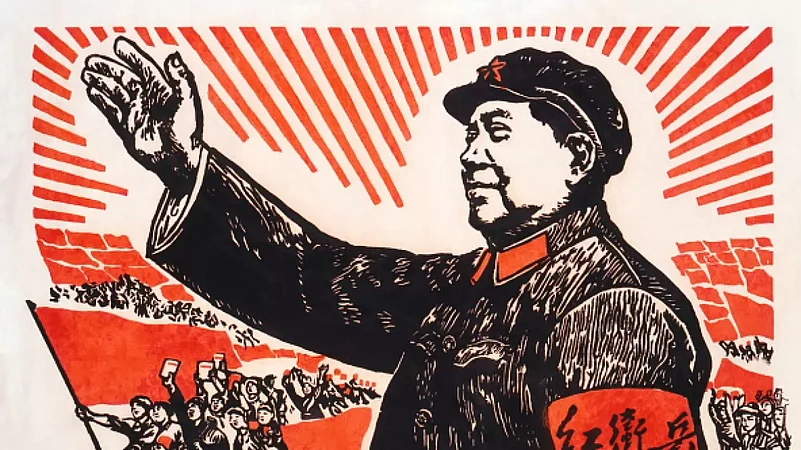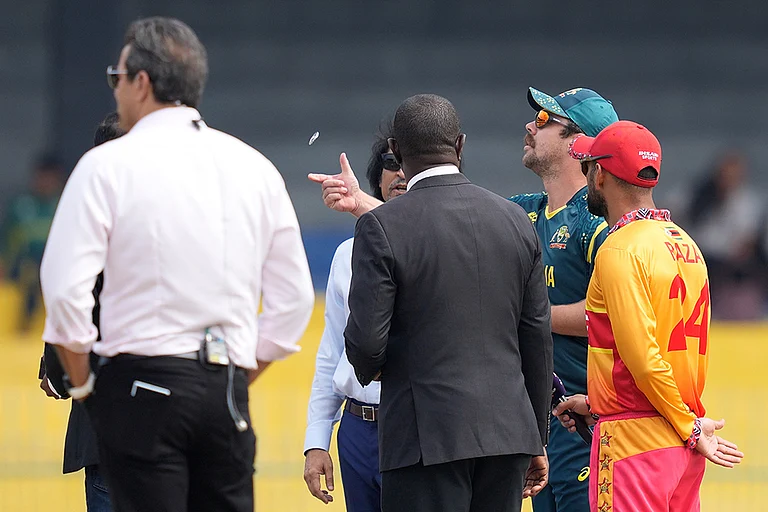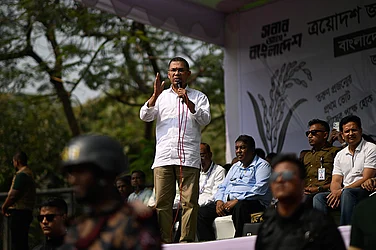Reading A Force So Swift: Mao, Truman, and the Birth of Modern China, 1949 by author Kevin Peraino gives an idea of America’s China policy at the height of power after World War II.
While US leaders now consider China’s rise as a “threat to the world,” there were some reconciliatory voices within the US administration in 1949. They had no sympathy for Mao though. They believed that the Chinese will change the system themselves in the mainland. Among them was US President Harry S Truman. He had firm faith that “Chinese people would eventually subvert communist rule”.
However, others like General Claire Chennault, the former commander of the Flying Tigers, thought the American “wait and see policy” would make Communist revolution spread throughout the wider region. To Frank Wisner, the head of the Office of Policy Coordination (OPC), the covert action arm of the post-war American intelligence apparatus, Chennault proposed a course to freeze Mao’s advance by “arming provincial leaders who could create a belt of resistance” around the Communist-controlled territories. Chennault, Peraino writes, “was optimistic about the Muslim leaders in China’s northwest” to halt Mao’s march.
In this gripping narrative, author Peraino takes you to 1949 China month by month and tells you how Mao was consolidating his position in China by pushing nationalist leader Chiang Kai-Shek from Nanjing to Shanghai and finally to Taiwan. He also write how Madam Chiang was desperately seeking help for her Nationalist forces while sitting in the United States and was sending coded telegram after telegram to her husband informing him of the results of about her efforts of seeking aid and sympathy at the same time. Chiang asked her to be more discreet in her cables.
Peraino tells us that Americans received Madam Chiang like a celebrity. Newspapers filled hundreds of columns with coverage of her speaking tour stops but President Truman was hard to conquer. He would complain to his advisors that any American assistance programme would be pouring “sand in a rat hole.” Though the Nationalist diplomats in the United States like Wellington Koo informed Truman that Nationalist forces near Changsha were fighting, Truman had “nothing but disgust with Chiang and his allies as the Nationalist forces were collapsing before Mao’s PLA”.'

On June 22, 1949, when Chinese diplomats were sounding optimistic to Truman that Muslim troops fighting in the country’s northwest seemed to be slowing Mao’s advance, Stalin had other advice for Mao: “Pay serious attention to Xinjiang, the home of China’s Muslim Uighur population, which the PLA had not yet subdued.”
Mao told Stalin that he thought any such operation would need to be postponed until the following year. But the author says the Soviet leader argued that Beijing should move more quickly as he believed that Xinjiang, rich in oil and cotton, could help revitalise the Chinese economy. Stalin would warn Mao that the delay would give chance to foreign powers like Britain to “activate the Muslims, including the Indian ones, to continue the civil war against the communists”.
The US Ambassador to China Leighton Stuart was for reconciliation. But Mao wrote in an essay: “All Chinese without an exception must lean either to the side of imperialism or to the side of socialism” and dashed Stuart’s hope. He wrote, “You have to choose between the alternatives of either killing the tiger or being eaten by it.”
There are other minute details in the book like Stalin describing Mao as a “margarine Marxist.” While in Moscow waiting for a commitment of aid from Stalin, when Mao saw nothing was maturing, he told his travelling companions that he had not come all this way simply to “eat, sleep and shit”.
Dean Acheson, the US Secretary of State, recalled his first hours in office: “Chiang was in the last stages of collapse and I arrived just in time to have him collapse on me.” Chiang Kai-Shek was to the director of Central Intelligence Hillenkoetter “the joker throughout is the Generalissimo”.
The Generalissimo while fleeing Chongqing —the last nationalist bastion— cursed the Truman administration for not doing more to come to his rescue. He wrote in his diary on November 30, 1949: “US China Policy is so unwise and so wrong that I worry about the security of the United States.” For the US ambassador to India, Lord Henderson, Nehru was a “vain, sensitive, emotional and complicated person.” For Nehru, the menu in the US was “long and exotic”.
Peraino writes that after the fall of Shanghai and Mao’s open declaration to align with the Soviets, George F Kennan, head of the Policy Planning Staff of the Truman administration, came up with a paper to extend the US “policy of Communist containment to Asia”. America’s security, the paper’s authors had written, depended on the strength of a “great crescent” of friendly nations that surrounded the Middle Kingdom including India, Australia, the Philippines, and Japan. At times, you feel you are not in 1949 but 2023.
In early August 1949, Dean Acheson released a white paper on China titled United States relations with China, with special reference to the period 1944-49, subjecting Chiang Kai-Shek to strong criticism and arguing that the Guomindang leaders had proved incapable of meeting the crisis confronting them. Its troops had lost the will to fight and its government had lost popular support, said the paper, adding that the reasons for the failure of the Chinese Nationalists do not stem from any inadequacy of American aid.
Acheson, the author says, had no tolerance for “cheap and cheerful universalism” and hence believed in “sort of a wait, look, see policy” toward China.
The release of the white paper created an uproar with American Republican Congressman Walter Judd saying after viewing the document that “Nationalist China’s record was not bad as I expected, while that of the American government is worse”. While Judd continue to see a remedy in Chennault’s plan to arm anti-Communist rebels in the mainland, Acheson remained unenthusiastic about the weapon shipment to the mainland, over or covert.
The Truman administration’s condemnation of Chiang did nothing to win Mao’s goodwill. In August, the Philippines President visited the United States and Mao in the summer of 1949 issued a rebuttal to the white paper. Picking from a line in the white paper that China’s history of “democratic individualism” would reassert itself soon on the mainland, Mao considered it as a veiled threat — a clear indication that U.S “troublemaking would continue on the mainland.”
The Americans, Mao believed, would seek to recruit Chinese business leaders and intellectuals as they quietly worked to overturn his revolution. These Chinese “middle-of-the-roaders” might not like Chiang and his Nationalists, Mao wrote, but neither they were firmly behind his own regime. He worried that they are vulnerable to the “honeyed words” of the Western Leaders.
Fearing that after China, the countries “like Burma, Thailand and Malaya” would turn to Communism, Truman and his advisors looked towards the regional leaders. One of the most important figures was Indian Prime Minister Pandit Jawaharlal Nehru. “Proud and assertive”, Peraino writes, Nehru was conscious of India’s position and was less eager than his American counterparts to confront Mao directly. “Although some in the Truman administration hoped that he (Nehru) would organise a regional block to oppose the Communists, he seemed more interested in conciliating Mao,” says the author.
When Nehru visited Washington on October 11, 1949 for a three-week tour, he generated much excitement as would “a motion picture star”. During the visit, the author writes, Nehru made it quickly clear that he was leaning toward recognising Mao’s new regime. The author writes that even Walter Judd, a cosmopolitan figure whose wife had been born and raised in India, seemed wholly unable to comprehend Nehru and his worldview. Peraino writes, “While Nehru saw Mao’s victory as a manageable local headache, Judd viewed it as an imminent global threat.”
Walter Judd lived to witness the “first twinklings of the PRC’s vertiginous economic ascent” and felt betrayed by President Nixon’s opening to China. Even 1980s Judd was fulminating about the “threats posed by the Beijing government”. In 1982, after an appearance on the television show Firing Line, Judd received a letter from a viewer, the 85-year-old Madam Chiang, praising him for his continued efforts. By the time the 20th century turned into 21st, Madam Chiang had celebrated her 100th birthday. Among the combatants of 1949, she survived and died at the age of 106 in 2003.
As rapid changes are taking place in the world with President Joe Biden’s national security strategy flagging China as a top threat and calling India a key partner, Peraino's book about diplomatic and battle events of 1949 China is fascinating. Stalin told Mao in their meeting that there would be no harm in keeping the Western powers on edge: “One could create a rumour that you are preparing to cross the border and in this way frighten the Imperialists a bit.” These days you don’t need to create rumours to get others frightened. You just fly a balloon and the world will be on the brink.
(Kevin Peraino's book A Force So Swift: Mao, Truman, and the Birth of Modern China, 1949 was published by Crown in 2017.)


























